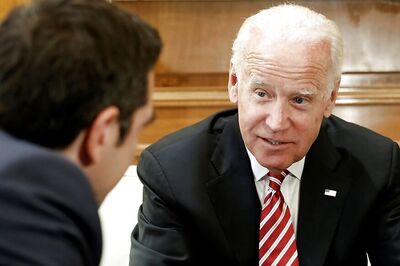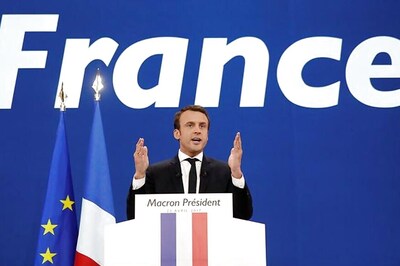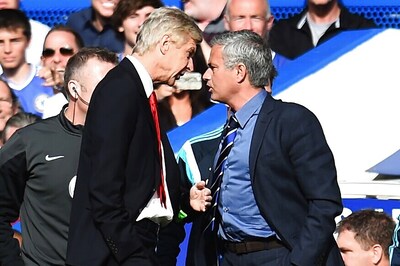
views
Donetsk: In an obscure government office guarded by a man in a red T-shirt armed only with a stick, two photocopy machines churned out ballots Thursday for eastern Ukraine's referendum on secession, as they have been doing around the clock for days.
In apparent defiance of a call by Russian President Vladimir Putin to put off the vote, insurgents in eastern Ukraine insisted on Thursday they will go ahead with this weekend's referendum as planned.
"Putin is seeking a way out of the situation. We are grateful to him for this," said Denis Pushilin, co-chairman of the Donetsk People's Republic, as the pro-Russian rebels call themselves.
"But we are just a bullhorn for the people," he declared. "We just voice what the people want."
Ukraine has in recent weeks grown perilously polarized, with the west looking toward Europe and the east favoring closer ties with Russia. Thursday's pronouncement was likely to further inflame tensions between the interim government in Kiev that took power amid chaos in February and the armed insurgents, who have seized police stations and government buildings in more than a dozen cities in the east.
Support for the referendum is most pronounced among eastern Ukraine's proudly Russian-speaking working class. Rage against the central government that came to power after months of nationalist-tinged protests is blended with despair at Ukraine's dire economic straits and corruption.
The occasionally violent protests that culminated in President Viktor Yanukovych's fleeing to Russia were viewed by many in the east as a coup and a portent of repression against the region's majority Russian speakers.
"This isn't our government. It's the government of those that destroyed everything," said construction laborer Galina Lukash, 48, who plans to vote in favor of autonomy.
Along with the vote Sunday in the eastern Donetsk region, a similar and even more hastily improvised referendum is to take place in the neighboring Luhansk region. Together they have about 6.5 million people.
The votes are similar to the one in Crimea in March that preceded Russia's annexation of that strategic Ukrainian Black Sea peninsula. Like the one in Crimea, they are regarded as illegitimate by both Kiev and the West.
But unlike the Crimean vote, which was held as Russian soldiers and affiliated local militias held control of the peninsula, the latest votes are being held amid armed conflict. And, critically, unlike Crimea, whose majority Russian-speaking population made approval a foregone conclusion, the Donetsk and Luhansk regions have a more mixed population.
A poll by the Washington-based Pew Research Center released on Thursday found that 70 percent of the residents of Ukraine's east want the country to maintain its current borders. That suggests Sunday's votes have a chance of failing, if opponents turn out in force and the count is honest.
However, those opposed to the referendum seem likely to ignore it, many out of fear or desperation over the anarchy that has taken grip in eastern Ukraine.
"This is a madhouse. That isn't a particularly literary word, I know, but there is no better way to put it. People are killing one another and we don't know why," said 58-year-old retiree Svetlana Amitina.
"We are remaining quiet, because we are simply afraid for our lives," said Diana Dekatiryova, a university student. "The thought I have is to stay away from the referendum, because nothing will depend on our vote anyway."
Putin's surprise call on Wednesday for the referendum to be put off appears on its surface to reflect Russia's desire to distance itself from the separatists. The West and the Ukrainian government accuse Russia of supporting or outright directing the unrest in the east, while Moscow denies involvement.
"Russia has made it clear it doesn't want the referendum, so it has no obligation to recognize its results, especially if it fails," said Alexei Makarkin, deputy head of the Moscow-based Center for Political Technologies think-tank.
Still, the swift decision by the insurgents' councils to go ahead with the vote raised questions about Putin's motive, and whether he was sincere in sounding a conciliatory note. In his remarks on Wednesday, the Russian leader also said Russian troops were being pulled back from the Ukrainian border, where their presence had raised fears that Moscow was looking for a pretext to invade.
However, Pentagon spokesman Army Col. Steve Warren said Thursday there had been no evidence of a pullback. "We've seen no change in the Russian force posture along the Ukrainian border," he said.
Meanwhile, in a high-ceilinged room with peeling paint and loose floor boards, preparations continued for Sunday's vote in a government building in the shadow of the regional administrative headquarters, now occupied by the insurgents. A lone unshaven man guarded the room, though armed men in camouflage milled about outside the regional headquarters.
Some 3 million paper ballots are all but ready, vote organizers said, and they ask one question: "Do you support the act of proclamation of independent sovereignty for the Donetsk People's Republic?"
Despite the phrasing, organizers insist they will decide only after the vote whether they want independence, greater autonomy within Ukraine or annexation by Russia.
Donetsk People's Republic elections chief Roman Lyagin said there will be around 1,200 polling stations and he expects a turnout of 70 percent.
"Preparations are going according to schedule. Almost the entire run of ballots has been prepared," Lyagin told The Associated Press.
The Donetsk People's Republic, which arose in chaotic and murky circumstances in early April, makes no pretense of its desire for full autonomy from Ukraine, which they say has been led by a "fascist junta" since the toppling of Yanukovych, a Donetsk native.
Russian state media describe the Donetsk People's Republic as "supporters of federalization," reflecting Moscow's official line that it would like Ukraine's government to devolve some powers to the regions.
But many in Donetsk say they would like their would-be republic to one day join their eastern neighbor. The Russian tricolor often flutters over the several dozen government offices seized and occupied by anti-government groups.
If Putin chooses to dash the hopes of those in his own country and in eastern Ukraine who crave another Crimea-style annexation, his now sky-high approval ratings could suffer. But pursuing expansionist goals, or even tacitly supporting anti-government movements in Ukraine, will likely prompt new and substantially more punitive Western sanctions against Russia.
Campaigning for the referendum has been negligible, largely relying on crude graffiti. Many sidewalks bear spray-painted stencil images of the word "referendum" next to a crossed-out swastika.
The Donetsk People's Republic has its own radio and television stations and a fledgling online presence, all of which have churned out a steady diet of anti-Kiev invective.
In the wake of the seizure by heavily armed pro-Russia gunmen of police stations and city halls, journalists, activists and politicians sympathetic to the government have started to go missing. Horlivka city council representative Volodymyr Rybak turned up dead, bearing signs of torture.
A climate of fear has grown, fueled by the now-common sight of gunmen roaming the regional capital, Donetsk, and other occupied cities.
The resolve of many pro-Russians has been emboldened by a Ukrainian government military campaign to recapture Slovyansk, 70 miles (110 kilometers) north of Donetsk and the heart of the insurgency.
A view shared by many anti-government activists - and eagerly promoted by Kremlin-backed television - is that Ukrainian authorities are shooting people who just want closer relations with Russia.
"They can't kill everybody. We must cry out. The whole world must learn about this," said Tamara Soynikova, 59, a member of a Donetsk People's Republic election panel in the city of Kostiantynivka.
In contrast, pro-Ukraine sentiments are especially pronounced among the younger generation, those with no memory of living in the Soviet Union.
"We were born in Ukraine, we live in Ukraine. What does it matter that we're Russian?" asked 18-year-old law student, Arakady Sabronov, an ethnic Russian.




















Comments
0 comment